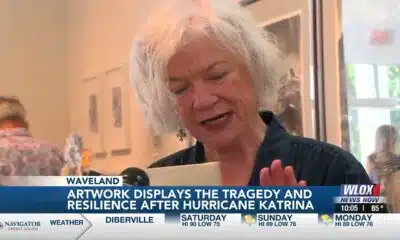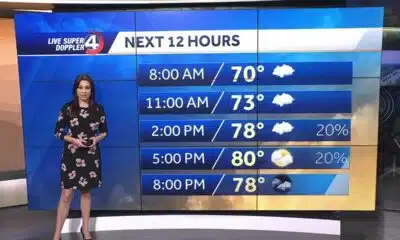News from the South - Kentucky News Feed
Morning weather forecast: 11/25/2024
SUMMARY: On this mild Monday morning, temperatures are around 60°F in parts of Kentucky, with colder areas in the east. Rain is expected late today, becoming more likely by the evening hours. After brief evening showers, tomorrow morning will start off cloudy but will transition to sunshine by afternoon. A colder air mass will move in, dropping temperatures to the upper 30s to low 40s. More rain is anticipated on Wednesday night into Thursday, potentially mixing with snowflakes on Thanksgiving. The forecast indicates continued cool temperatures into the weekend, with possible flurries around Black Friday and through Sunday.
It’s beginning to look a lot like Christmas. Okay, maybe not at this moment. Mild temperatures are showers dominate today’s forecast, but snowflakes could fall while temperatures plummet around Thanksgiving. Stay tuned!
Subscribe to FOX 56 News on YouTube: https://www.youtube.com/c/FOX56News/?sub_confirmation=1
See more Crime Stoppers stories: https://FOX56News.com/news/crime-stoppers/
Stay informed about central Kentucky news, weather, and sports! Follow FOX 56 on our website and social channels:
https://www.FOX56News.com
https://www.youtube.com/c/FOX56News
https://www.facebook.com/FOX56News
https://twitter.com/FOX56News
https://www.instagram.com/FOX56News
https://www.linkedin.com/company/FOX56News
News from the South - Kentucky News Feed
Staying hot with rain chances returning this week
SUMMARY: The weather remains hot, with temperatures reaching the lower 90s and some isolated showers recently developing. Better rain chances return midweek, especially Wednesday, which is expected to bring scattered thunderstorms, heavy downpours, and gusty winds due to a trough moving in from the northwest. Tuesday may see a stray shower as moisture increases, but mostly dry conditions will last through early week. After Wednesday and Thursday showers, heat will return, with temperatures in the lower 90s by the weekend. The Kentucky State Fair is forecasted to be hot and mostly dry, but locals are advised to stay hydrated amid the persistent heat and humidity.
WLKY meteorologist Eric Zernich’s Sunday evening forecast
Subscribe to WLKY on YouTube now for more: http://bit.ly/1e5KyMO
Get more Louisville news: http://www.wlky.com
Like us: http://www.facebook.com/wlkynews
Follow us: http://twitter.com/WLKY
Instagram: https://www.instagram.com/wlky/
News from the South - Kentucky News Feed
What could a street art program look like in Lexington?
SUMMARY: On August 12th, Principal Planner Hannah Crepps will present plans for a new street art program in Lexington at the Environmental Quality and Public Works Committee meeting. The program aims to formalize street art projects, which many U.S. cities use to calm traffic and reduce crashes by incorporating painted crosswalks and road designs. Lexington will draft guidelines including funding sources, community decision-making, and traffic safety compliance. A pilot chalk art project was tested in May 2025 on Shropshire Avenue. Residents can engage with the program by contacting Crepps and watching the live meeting online or in person.
The post What could a street art program look like in Lexington? appeared first on lexingtonky.news
News from the South - Kentucky News Feed
Evening Forecast 8/9/2025
SUMMARY: The evening forecast for central Kentucky on August 9, 2025, shows mostly clear skies with isolated downpours having fizzled out. Temperatures remain warm, in the mid-70s this evening, dipping to mid-upper 60s overnight with patchy fog possible in valleys. Sunday will bring steamy sunshine, a mix of sun and clouds, highs near 90°F, and isolated showers. Early next week remains typical August weather with spotty downpours Monday, a few storms Tuesday, and increased scattered rain chances Wednesday and Thursday, coinciding with many schools reopening. Overall, dry and calm conditions prevail tonight and Sunday, with rain chances rising midweek.
Evening Forecast 8/9/2025 Subscribe to FOX 56 News on YouTube: …
-
Mississippi Today6 days ago
After 30 years in prison, Mississippi woman dies from cancer she says was preventable
-
News from the South - Texas News Feed6 days ago
Texas redistricting: What to know about Dems’ quorum break
-
News from the South - North Carolina News Feed4 days ago
Two people unaccounted for in Spring Lake after flash flooding
-
News from the South - Florida News Feed7 days ago
Warning for social media shoppers after $22K RV scam
-
News from the South - Georgia News Feed7 days ago
Georgia lawmakers to return this winter to Capitol chambers refreshed with 19th Century details
-
News from the South - Texas News Feed7 days ago
Pritzker says Texas Democrats who fled state will be protected amid arrest threats
-
Mississippi Today6 days ago
Brain drain: Mother understands her daughters’ decisions to leave Mississippi
-
News from the South - Georgia News Feed6 days ago
29-year-old killed after driving off road in 'dangerous' section road | FOX 5 News










































